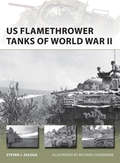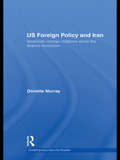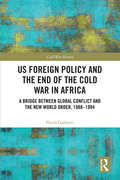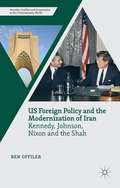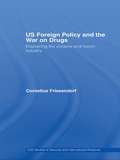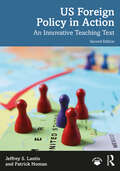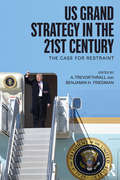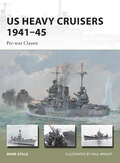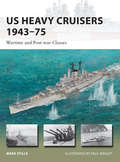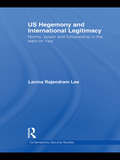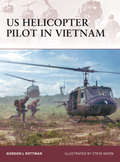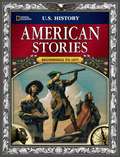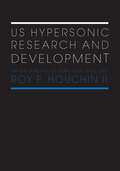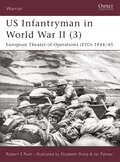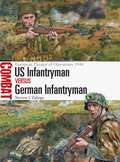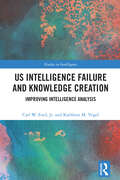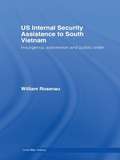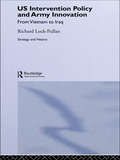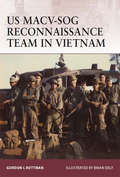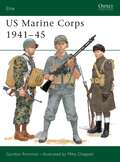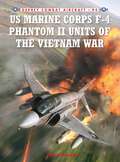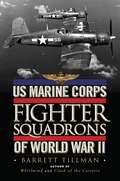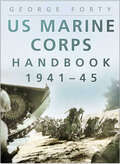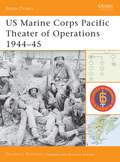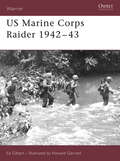- Table View
- List View
US Flamethrower Tanks of World War II
by Steven Zaloga Richard ChasemoreAmerican experience, from D-Day to dug-in Japanese defenders, went from British Crocodile to E4-7, USMC Satan, and the many POA-CWS (Pacific Area Operation-Chemical Warfare Section) flamethrower tank variants chronicled in this book.The US Army and Marine Corps experimented with a wide range of flame-thrower tanks through World War II in both the European and Pacific theaters. This book will examine early efforts in the US, the ill-fated attempt to adopted the British Crocodile for D-Day in Normandy, the adoption of the auxiliary E4-7 in the European Theater, and the use of British Crocodile flamethrower units in the ETO. Although the US Army deployment of flame-thrower tanks in the ETO was problematic at best, flamethrowers were much more widely used in the Pacific theater and became ubiquitous by 1945, including an entire Army flamethrower tank battalion on Okinawa in 1945, the largest single use of flamethrower tanks in World War II. This will cover the initial attempts at the use of auxiliary flamethrowers by both the US Army and Marine Corps in 1943, the standardized adoption of the Satan flamethrower tank by the Marines in 1944, the development of main gun flamethrowers by the Marines and US Army based on the POA-CWS (Pacific Area Operation-Chemical Warfare Section) designs, and the myriad other types tested in combat including the powerful LVT-4 design using Navy flamethrowers at Peleliu in 1944. Due to the extensive Japanese use of fortifications in the final year of the Pacific war, Flamethrower tanks became one of the most important solutions in American tactics.
US Foreign Policy and Iran: American-Iranian Relations since the Islamic Revolution (Contemporary Security Studies)
by Donette MurrayUS Foreign Policy and Iran is a study of US foreign policy decision-making in relation to Iran and its implications for Middle Eastern relations. It offers a new assessment of US-Iranian relations by exploring the rationale, effectiveness and consequences of American policy towards Iran from the aftermath of the 1979 Iranian Revolution to the present day. As a key country in a turbulent region and the recipient of some of the most inconsistent treatment meted out during or after the Cold War, Iran has been both one of America's closest allies and an 'axis of evil' or 'rogue' state, targeted by covert action and contained by sanctions, diplomatic isolation and the threat of overt action. Moreover, since the attacks of 11 September 2001, Iran has played a significant role in the war on terror while also incurring American wrath for its links to international terror and its alleged pursuit of a nuclear weapons programme. US Foreign Policy and Iran will be of interest to students of US foreign policy, Iran, Middle Eastern Politics and international security in general Donette Murray is a Senior Lecturer in the Department of Defence and International Affairs at the Royal Military Academy Sandhurst. She was awarded a PhD in International History by the University of Ulster in 1997.
US Foreign Policy and the End of the Cold War in Africa: A Bridge between Global Conflict and the New World Order, 1988-1994 (Cold War History)
by Flavia GasbarriThis book investigates the end of the Cold War in Africa and its impact on post-Cold War US foreign policy in the continent. The fall of the Berlin Wall is widely considered the end of the Cold War; however, it documents just one of the many "ends", since the Cold War was a global conflict. This book looks at one of the most neglected extra-European battlegrounds, the African continent, and explores how American foreign policy developed in this region between the late 1980s and the early 1990s. Drawing on a wide range of recently disclosed documents, the book shows that the Cold War in Africa ended in 1988, preceding the fall of the Berlin Wall. It also reveals how, since then, some of the most controversial and inconsistent episodes of post-Cold War US foreign policy in Africa have been deeply rooted in the unique process whereby American rivalry with the USSR found its end in the continent. The book challenges the traditional narrative by presenting an original perspective on the study of the end of the Cold War and provides new insights into the shaping of US foreign policy during the so-called ‘unipolar moment’. This book will be of much interest to students of Cold War history, US foreign policy, African politics and international relations.
US Foreign Policy and the Modernization of Iran: Kennedy, Johnson, Nixon, and the Shah (Security, Conflict and Cooperation in the Contemporary World)
by Johnson Kennedy Nixon the ShahUS Foreign Policy and the Modernization of Iran examines the evolution of US-Iranian relations during the presidencies of John F. Kennedy, Lyndon B. Johnson, and Richard M. Nixon. It demonstrates how successive administrations struggled to exert influence over the Shah of Iran's regime domestic and foreign policy.
US Foreign Policy and the War on Drugs: Displacing the Cocaine and Heroin Industry (Css Studies In Security And International Relations)
by Cornelius FriesendorfThis book examines the geographic displacement of the illicit drug industry as a side effect of United States foreign policy. To reduce the supply of cocaine and heroin from abroad, the US has relied on coercion against farmers, traffickers and governments, but this has only exacerbated the world's drugs problems.US Foreign Policy and the War on Dr
US Foreign Policy in Action: An Innovative Teaching Text (Principles Of Political Science Ser.)
by Jeffrey S. Lantis Patrick HomanThis book represents a timely exploration of the dynamics of U.S.foreign policy development. It introduces historical developments and theories of U.S. foreign policy and engages students in the politics and debates of the foreign policy process (both directly and by proxy) through innovative learning exercises. This book offers a rich understanding of the politics behind clashing perspectives towards contemporary foreign policy challenges ranging from immigration policy controversies to COVID-19 pandemic responses, climate change to the China trade war. All of these issues are presented in dynamic ways that focus on activism and engagement in the policy process—and so this text speaks directly to a new generation of college students who have mobilized to political activism. The book is intended to serve as a core text for classes on U.S. foreign policy at the 200-level or above and will appeal to a broad audience. New to the Second Edition: Provides insights on contemporary foreign policy challenges facing the Biden administration and future presidents, such as climate change, the rise of China, sanctions and trade policies, and changing U.S. engagement in the Middle East. Offers stronger theoretical foundations for the study of domestic constraints in the foreign policy decision-making process, including the power of interest groups and political polarization in Congress. Explains pedagogical treatments of online and hybrid learning applications, along with presenting new exercises to engage students both in person in the classroom and online. Presents more detailed and critical historical analyses of U.S. foreign policy, including greater attention to the U.S. as an imperial power and its implications for politics and society. Creates new and exciting active learning exercises for instructors and students, including role-playing simulations of global public health crisis management and group research projects on cybersecurity and immigration policy. Enriches the graphics and illustrations of foreign policy actors and processes in a full-color presentation. Analyzes contemporary foreign policy issues in the Trump and Biden administrations. Adds new web components and features, some authored by undergraduate students who are becoming experts in U.S. foreign policy. Includes new writing exercises and assignments designed to promote creative and critical thinking about foreign policy actors and processes.
US Grand Strategy in the 21st Century: The Case For Restraint (Routledge Global Security Studies)
by A. Trevor Thrall Benjamin H. FriedmanThis book challenges the dominant strategic culture and makes the case for restraint in US grand strategy in the 21st century. Grand strategy, meaning a state’s theory about how it can achieve national security for itself, is elusive. That is particularly true in the United States, where the division of federal power and the lack of direct security threats limit consensus about how to manage danger. This book seeks to spur more vigorous debate on US grand strategy. To do so, the first half of the volume assembles the most recent academic critiques of primacy, the dominant strategic perspective in the United States today. The contributors challenge the notion that US national security requires a massive military, huge defense spending, and frequent military intervention around the world. The second half of the volume makes the positive case for a more restrained foreign policy by excavating the historical roots of restraint in the United States and illustrating how restraint might work in practice in the Middle East and elsewhere. The volume concludes with assessments of the political viability of foreign policy restraint in the United States today. This book will be of much interest to students of US foreign policy, grand strategy, national security, and International Relations in general.
US Heavy Cruisers 1941-45 - Pre-war Classes
by Paul Wright Mark StilleAmerican Navy cruisers built prior to World Wat II saw extensive action throughout the Pacific War, in both surface actions like Guadalcanal, and carrier battles like Midway.Designed and produced under the regulations of the Washington Naval Treaty, the heavy cruisers of the Pensacola, Northampton, Portland, New Orleans and Wichita classes were exercises in compromise. While they possessed very heavy armament, the Pensacolas, for example, carrying a main battery of ten 8" guns, this came at the cost of protection - armor was the same thickness as a gun cruiser, and incapable of protecting the vessels from enemy 8" fire. As the classes evolved, these flaws began to be corrected, with the main battery being reduced, and increased protection being added to the vital areas of the ship. Despite these drawbacks, the pre-war heavy cruiser classes served with distinction throughout World War II.
US Heavy Cruisers 1943-75
by Paul Wright Mark StilleUS Heavy Cruisers provides a detailed, illustrated look at the wartime and post-war-built heavy cruiser classes of the US Navy of World War II.Fast and heavily armed, the Baltimore class was an evolution of the heavy cruiser designs from before World War II, but without the limitations imposed by the Washington Naval Treaty. Versatile vessels, the heavy cruisers of the Baltimore class, and their successors in the Oregon City and Des Moines classes, commonly acted as carrier escorts throughout World War II, but also performed bombardment duties in support of amphibious landings. Post-World War II, the heavy cruisers continued to see service, chiefly in Korea and Vietnam. Even after the heyday of the heavy cruiser had passed, the ships continued to serve - several were converted into the earliest examples of guided missile cruisers, and established an enduring legacy in the US Navy.
US Hegemony and International Legitimacy: Norms, Power and Followership in the Wars on Iraq (Contemporary Security Studies)
by Lavina Rajendram LeeThis book examines US hegemony and international legitimacy in the post-Cold War era, focusing on its leadership in the two wars on Iraq. The preference for unilateral action in foreign policy under the Bush Administration, culminating in the use of force against Iraq in 2003, has unquestionably created a crisis in the legitimacy of US global leadership. Of central concern is the ability of the United States to act without regard for the values and interests of its allies or for international law on the use of force, raising the question: does international legitimacy truly matter in an international system dominated by a lone superpower? US Hegemony and International Legitimacy explores the relationship between international legitimacy and hegemonic power through an in depth examination of two case studies – the Gulf Crisis of 1990-91 and the Iraq Crisis of 2002-03 – and examines the extent to which normative beliefs about legitimate behaviour influenced the decisions of states to follow or reject US leadership. The findings of the book demonstrate that subordinate states play a crucial role in consenting to US leadership and endorsing it as legitimate and have a significant impact on the ability of a hegemonic state to maintain order with least cost. Understanding of the importance of legitimacy will be vital to any attempt to rehabilitate the global leadership credentials of the United States under the Obama Administration. This book will be of much interest to students of US foreign policy, IR theory and security studies. Lavina Rajendram Lee is a lecturer in the Department of Modern History, Politics and International Relations at Macquarie University, Australia, and has a PhD in International Relations from the University of Sydney.
US Helicopter Pilot in Vietnam
by Steve Noon Gordon RottmanOne of the most enduring and vivid images of Vietnam is the helicopter. There is little doubt that the helicopter revolutionized warfare and how the war in Vietnam (1955-1975) was fought. Helicopters lifted troops, supplies, material, equipment, and vehicles. They conducted visual reconnaissance, command and control, medical evacuation, artillery spotting, fire support, and countless administrative tasks. They were aerial weapons platforms and aerial trucks. The 40,000 pilots were the men behind this revolution. Many helicopter pilots were thrill seekers to some degree. They liked fast cars and a fast life. To "party hardy" was a common term used to describe their lifestyle. They loved to fly and the war gave them the opportunity to do that. They were little concerned with the politics of the war, the conflicts back at home, and could care less about the drug culture, sexual revolution, the environment, and other social issues that defined their generation. A common aviator's phrase was, "Who needs drugs, I'm already high." Helicopter pilots experienced a broad range of combat, from air-lift, med-evac and fire-support to landing in 'Hot LZs', in which choppers would find themselves caught in deadly high-volume crossfires. Crew protection, other than armored seats for the pilots, was minimal. There was little armor to protect vital engines, transmissions, and fuel tanks. Crashes were survivable, but aircrews suffered relatively high casualties. Enemy action was not the only cause for concern. Of the 4,642 US helicopters lost in Vietnam, over half were due to non-hostile causes-accidents, mechanical failure, weather, and other non-combat causes. Aviators had to deal with long flying hours in a less than pleasant climate, heat, humidity, dust, rapidly changing weather conditions, spare parts shortages, and spotty maintenance. All of these accumulated to make the lives of natural risk-takers more dangerous. This book will reveal their experiences from their first deployment to the deadly thrill of combat in a war zone. Accompanied by poignant photographs and written by a Vietnam veteran, this is a crucial addition to our coverage of the conflict that defined the post-war generation in America.From the Trade Paperback edition.
US History: American Stories, Beginnings to 1877
by National Geographic StaffThe history of the United States is a chronicle of different regions that today are pulled together on a cultural basis. In the early years, our identity as a nation was defined on a military or political basis-- and we're still struggling with those differences.
US Hypersonic Research and Development: The Rise and Fall of 'Dyna-Soar', 1944-1963 (Space Power and Politics)
by Roy F. Houchin IIAn essential new account of some of the most valuable research and development in international military history. Roy F. Houchin II shows how the roots of US Air Force hypersonic research and development are grounded in Army Air Force General Henry H. 'Hap' Arnold's identification of the need for advanced airpower weapon systems to meet the anticipated postwar enemy threat. The technology for a smooth transition to military spaceflight seemed within reach when Bell Aircraft Corporation executive Walter Dornberger (the former commander of Nazi Germany's V-2 rocket research) made an unsolicited proposal to William E. Lamar (the chief of Wright Aeronautical Development Center's New Development Office of the Bomber Aircraft Division at Wright-Patterson AFB, OH) for a hypersonic boost-glide weapon system. Visionaries like Arnold, Dornberger, and Lamar believed a hypersonic boost-glider would represent the ultimate expression of the US Air Force's doctrine by performing strategic bombardment and reconnaissance more successfully any other type of vehicle. As this aspiration reached maturity in Dyna-Soar, the service's leadership never gave up their beliefs. This book shows how the struggle to persuade the secretary of defence and his advisors, who did not share the Air Force's vision for a military spaceplane, illustrates the ebb and flow of an advanced technology program and its powerful legacy within American society.
US Infantryman in World War II
by Robert Rush Elizabeth SharpThe ETO is seen by many as the major theater of World War II (1939-1945), with more infantry regiments serving there than any other. This title follows one soldier ("Joseph") as he is drafted in February 1941, trains with the 22d Infantry in the United States and then ships to England in January 1944. On D-Day he lands on Utah Beach and in the following months fights through France, Belgium, and into Germany. The problems the common soldier faced between June 1944 and May 1945 are dealt with in particular in this authoritative and moving book.
US Infantryman vs German Infantryman
by Steven ZalogaThe Allied airborne and amphibious landings in Normandy on D-Day on June 6, 1944, opened up the long-awaited Second Front against Nazi Germany, but after overcoming the German coastal defenses at Utah and "Bloody Omaha," the US Army found itself having to contest every hedgerow and street in a nightmarish battle of attrition. Even once Normandy had been secured for the Western Allies, the grueling battles on the Siegfried Line, the Ardennes, and elsewhere would test both sides to the limit before the Germans' unconditional surrender of May 1945.Featuring full-color artwork, specially drawn maps, and archive photographs, this study offers key insights into the tactics, leadership, combat performance, and subsequent reputations of six representative US and German infantry battalions pitched into three pivotal actions that determined the course of the campaign for mastery in Western Europe at the height of World War II.It was the humble infantrymen of both sides who would play a vital role in taking and holding key objectives, from the hedgerow warfare around the key French port of Cherbourg in June 1944 to the struggle for Übach-Palenberg during the Allies' initial thrust into Germany in October and the savage cold-weather fighting of the Germans' Ardennes counter-offensive that December. Bitter lessons were learned and relearned by a succession of US divisions committed to the fighting, while the Germans found themselves forced to keep battered and under-strength formations in the front line until they were effectively destroyed by the relentless pressure of the Allied advance.
US Intelligence Failure and Knowledge Creation: Improving Intelligence Analysis (Studies in Intelligence)
by Kathleen M. Vogel Carl W. Ford, Jr.This book examines the roots and elements of the research and knowledge-generation problems in US intelligence.The work identifies the crux of the problem as the lack of a research capability in US intelligence, which has developed over the past 40 years due to a variety of organizational decisions that prioritized current intelligence reporting and a focus on structural solutions to fix intelligence failures. The book argues that this is the principal cause of recent major intelligence failures regarding 9/11, the 2003 Iraq War, and the current Russia–Ukraine War. Throughout the book, the authors aim to provide short-, medium-, and long-term, policy-relevant recommendations to intelligence officials and members of the US Congress, in the form of workforce, leadership, and organizational changes that can be implemented to address existing research shortcomings in intelligence analysis. The book’s conclusions will also be relevant to the intelligence agencies of other countries.This book will be of much interest to students of intelligence studies, national security, US politics, defense studies, and international relations.
US Internal Security Assistance to South Vietnam: Insurgency, Subversion and Public Order (Cold War History)
by William RosenauThis new study of American support to the regime of Ngo Dinh Diem in South Vietnam illuminates many contemporary events and foreign policies. During the Eisenhower and Kennedy administrations, the United States used foreign police and paramilitary assistance to combat the spread of communist revolution in the developing world. This became the single largest internal security programme during the neglected 1955-1963 period. Yet despite presidential attention and a sustained campaign to transform Diem’s police and paramilitary forces into modern, professional services, the United States failed to achieve its objectives. Given the scale of its efforts, and the Diem regime’s importance to the US leadership, this text identifies the three key factors that contributed to the failure of American policy. First, the competing conceptions of Diem’s civilian and military advisers. Second, the reforms advanced by US police training personnel were also at odds with the political agenda of the South Vietnamese leader. Finally, the flawed beliefs among US police advisers based on the universality of American democracy. This study also shows how notions borrowed from academic social science of the time became the basis for building Diem’s internal security forces. This book will be of great interest to all students and scholars of intelligence studies, Cold War studies, security studies, US foreign policy and the Vietnam War in general.
US Intervention Policy and Army Innovation: From Vietnam to Iraq (Strategy and History)
by Richard Lock-PullanUS Intervention Policy and Army Innovation examines how the US Army rebuilt itself after the Vietnam War and how this has affected US intervention policy, from the victory of the Gulf War to the failure of Somalia, the Bosnian and Kosovo interventions and the use of force post 9/11. Richard Lock-Pullan analyzes the changes in US military intervention strategy by examining two separate issues: the nature of the US Army as it rebuilt itself after the Vietnam War, and the attempts by the US to establish criteria for future military interventions. He first argues that US strategy traditionally relied upon national mobilization to co-ordinate political aims and military means; he subsequently analyzes how this changed to a formula of establishing militarily achievable political objectives prior to the use of force. Drawing on a vast body of material and on strategic culture and military innovation literature, Lock-Pullan demonstrates that the strategic lessons were a product of the rebuilding of the Army's identity as it became a professional all-volunteer force and that the Army's new doctrine developed a new 'way of war' for the nation, embodied in the AirLand Battle doctrine, which changed the approach to strategy. This book finally gives a practical analysis of how the interventions in Panama and the Gulf War vindicated this approach and brought a revived confidence in the use of force while more recent campaigns in Somalia, Kosovo and Bosnia exposed its weaknesses and the limiting nature of the Army's thinking. The legacy of the Army's innovation is examined in the new strategic environment post 9/11 with the operations in Afghanistan and Iraq.
US MACV-SOG Reconnaissance Team in Vietnam
by Gordon Rottman Brian DelfOsprey's study of the Military Assistance Command of the Vietnam War (1955-1975). In 1964 Military Assistance Command, Vietnam, activated a joint unconventional task force known as the Studies and Observation Group--MACV-SOG. As a cover its mission was to conduct analysis of lessons learned in combat involved all branches of service. SOG's real mission was to conduct covert strategic reconnaissance missions into Laos, Cambodia, and South Vietnam as well as sabotage and 'Black' psychological operations. Ground, air, and naval assets were employed to insert, collect, extract, and otherwise support these operations. Drawing on detailed, first-hand accounts of the experiences of the service, including action on operations, this book will shed light on one of the most crucial units of the Vietnam War.From the Trade Paperback edition.
US Marine Corps 1941-45
by Gordon Rottman Mike ChappellWhile the US Marine Corps was one of the smallest of American armed services in World War II (1939-1945), its contribution to the final victory cannot be overstated. The US Marine Corps may have only comprised 5 percent of America's armed forces, but it suffered 10 percent of all World War II combat casualties. Above all, the amphibious nature of the war in the Pacific imposed on the Marine Corps greater tasks than any it had ever before been called upon to perform. This title details the organization, weapons and equipment of the US Marines of World War II.
US Marine Corps F-4 Phantom II Units of the Vietnam War
by Jim Laurier Peter DaviesTwenty-five US Marine Corps squadrons flew versions of the Phantom II and 11 of them used the aircraft in Southeast Asia from May 1965 through to early 1973. Although one deployment was from an aircraft carrier, and included a successful MiG engagement, most missions were flown from land bases at Da Nang and Chu Lai in South Vietnam, and Nam Phong in Thailand. Rather than the air-to-air missiles that were the main component in the original F-4 armament, these aircraft carried an ever-expanding range of weaponry. Some toted 24 500-lb bombs and others strafed with up to three 20 mm gun pods, while most flew daily sorties delivering napalm, Snakeye bombs and big Zuni rockets. Many US Marines holding small outpost positions in Laos and South Vietnam against heavy Viet Cong attack owed their lives to the Phantom II pilots who repeatedly drove off the enemy. Very often their bombing passes had to be made at very low altitude beneath low cloud or at night, dropping their ordnance only 50 metres from 'troops in contact'. Like US Navy Phantom IIs, they flew Skyspot blind-bombing sorties, offshore barrier CAP missions to fend off MiGs and air defence 'hot pad' missions for their home bases. The US Marine Corps prided itself on being a self-contained fighting force. The RF-4B reconnaissance version of the Phantom II was produced exclusively for the USMC to provide its own airborne photo intelligence, and one unit equipped with these jets flew more than 200 missions per month with only five aircraft serviceable on most days. The book will examine these missions in the context of US Marine Corps close-support doctrine, using the direct experience of a selection of the aircrew who flew and organised those missions.
US Marine Corps Fighter Squadrons of World War II
by Barrett TillmanThe classic 1951 movie Flying Leathernecks starring John Wayne immortalized the USMC pilots who had fought in the skies over Guadalcanal and the Solomons. The US Marine Corps has a long and proud heritage of aviation excellence, celebrating its centenary in 2012. While "flying leathernecks" made their mark in both world wars, Korea, Vietnam and more recently throughout the global war on terrorism, it was during World War II that they captured the hearts and minds of the public with their daring exploits. This is the first book to detail the legendary actions of famous fighter aces such as Medal of Honor winner John L Smith, Greg "Pappy" Boyinton, Marion Carl, Joe Foss, and many more. Barrett Tillman combines expert research into the history and organization of the Marine Fighter Squadrons with dramatic accounts of deadly dogfights.From the Hardcover edition.
US Marine Corps Handbook 1941-45
by George FortyEmploying a range of archive black and white photographs, this book examines the US Marine Corps' organisation and command structure, strategy, tactics and amphibious assault doctrine. Providing biographies of its most influential figures, it also surveys insignia, uniforms and equipment to provide a portrait of the US Marine Corps at war.
US Marine Corps Pacific Theater of Operations 1941-43
by Gordon RottmanThe outbreak of World War II set in motion a massive expansion of the United States Marine Corps, leading to a 24-fold increase in size by August 1945. This book is the first of several volumes to examine the Corps's meteoric wartime expansion and the evolution of its units. It covers the immediate pre-war period, the rush to deploy defense forces in the war's early months, and the Marines' first combat operations on Guadalcanal, New Georgia, and Bougainville. It focuses on the 1st, 2d, and 3d Marine Divisions (MarDivs) and the provisional 1st, 2d, and 3d Marine Brigades (MarBdes).
US Marine Corps Raider 1942-43
by Ed GilbertOsprey's study of the US Marine Raiders (an 'elite within an elite') during World War II (1939-1945). The US Marine Raiders were modeled on the British Commandos and, in the 2nd Battalion, also on Communist Chinese guerillas. They were organized to conduct long-range amphibious hit-and-run raids behind Japanese lines and trained to secure beacheads in advance of more conventional landings. Raiders were trained to land from submarines, specially converted high-speed destroyer transports, and small craft and rubber boats. They were expected to be skilled in watercraft, jungle survival, and jungle warfare. They were the earliest forerunners of the various Special Operations units of the modern US military. Raider units would conduct operations with only the equipment they could carry on their backs, their heaviest weapons being light mortars and machine guns. They were the first American units to be issued with specially manufactured camouflage uniforms and rubber-soled boots developed for jungle warfare. Highly trained in close-in fighting, they carried many distinctive weapons such as the Fairbairn Commando dagger, the Browning Automatic Rifle (BAR), the Thompson submnachine gun and even the British Boys Anti-Tank Rifle.The Raiders battle honors include Guadalcanal, as well as the Solomon Islands and the Dragon Peninsula campaign. This book follows two Raiders from different battalions through some of the toughest training ever experienced by a Marine and onto combat during the Makin Raid and the horrific jungle battles of the Solomon Islands giving a soldier's eye view of life, combat and death in this 'elite within an elite'.
